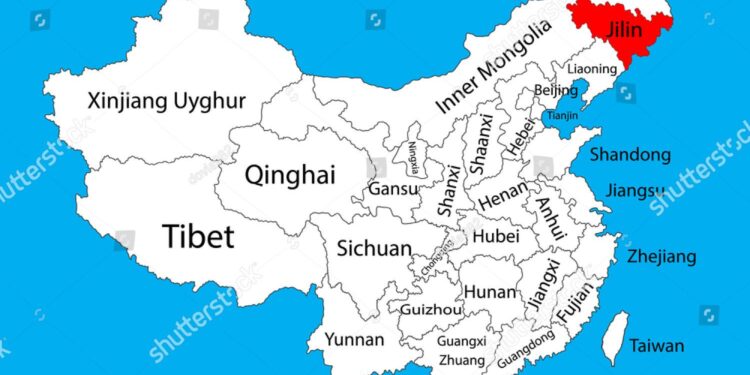In a notable development amid ongoing challenges posed by the COVID-19 pandemic, the capital city of Jilin province, Changchun, has issued an official apology for recent food shortages experienced by its residents. The shortages have been attributed to stringent COVID-19 control measures that disrupted supply chains and restricted movement. As authorities scramble to address the situation, local officials have acknowledged the hardships faced by the population and are implementing strategies to alleviate food insecurity. This situation highlights the broader implications of pandemic policies on daily life in urban China, as cities strive to balance public health measures with the welfare of their citizens.
Jilin City Acknowledges Food Supply Crisis Amid COVID Restrictions
In a surprising announcement, officials from Jilin City expressed their regret regarding the ongoing food supply crisis, which has been exacerbated by stringent COVID-19 restrictions. The lockdown measures, aimed at curbing the spread of the virus, have left many residents struggling to access basic necessities. This situation has raised significant concerns over food security and the local government’s ability to address its citizens’ needs during unprecedented times.
In response, local authorities are implementing measures to alleviate these shortages, including:
- Establishing emergency supply channels: Collaborating with neighboring regions to secure food deliveries.
- Enhancing distribution logistics: Streamlining delivery processes to ensure timely access to essentials.
- Engaging community cooperation: Mobilizing volunteers to assist in distribution efforts.
As Jilin City navigates this complex situation, officials are keen to restore trust among the population by ensuring that vital supplies reach every household while maintaining public health measures. The plight of Jilin residents highlights the delicate balance between managing a health crisis and ensuring food security.
Analysis of Supply Chain Disruptions and Community Impact
The recent apology from Jilin province’s capital, Changchun, highlights the profound impact of stringent COVID-19 restrictions on local supply chains and the broader community. Food shortages have emerged as a direct consequence of lockdowns, causing significant distress among residents. With the shutdown of transportation networks and reduced workforce availability, access to essential goods has been seriously compromised. This disruption has not only led to scarcity at grocery stores but has also driven prices higher, leaving many in vulnerable positions.
In response to these challenges, local authorities have initiated several measures to mitigate the impact on the community. Efforts include:
- Emergency food distribution: Establishing programs to deliver essential supplies directly to citizens.
- Local sourcing initiatives: Encouraging the utilization of local farms and producers to ensure food availability.
- Public communication campaigns: Keeping the community informed about food resources and assistance programs.
To better illustrate the consequences of supply chain disruptions, the following table outlines the key facets of the situation:
| Impact Area | Description |
|---|---|
| Food Supply | Increased shortages and reliance on emergency provisions. |
| Pricing | Significant hikes in prices of essential goods. |
| Community Well-Being | Increased anxiety and hardships for families. |
Strategies for Enhancing Food Security in Jilin Province Moving Forward
To address the pressing challenges of food insecurity in Jilin Province, a multifaceted approach is crucial. Stakeholders can implement several strategies that focus on building resilience within the food supply chain. Initiatives should include:
- Enhancing Local Agricultural Production: Support for farmers through subsidies for seeds, fertilizers, and technology to increase crop yields.
- Investing in Infrastructure: Improving transportation and storage facilities to reduce food wastage and ensure timely delivery to markets.
- Strengthening Community Gardens: Encouraging urban agriculture projects to supplement food supplies and engage local communities.
- Promoting Nutrition Education: Launching campaigns to encourage healthy eating and the consumption of locally sourced foods.
In addition to the above strategies, collaboration among government bodies, agricultural organizations, and local communities will be vital. A proposed framework for enhancing food security could involve:
| Area of Focus | Action Item | Expected Outcome |
|---|---|---|
| Policy Development | Establishing long-term food security policies | Increased agricultural stability |
| Research and Innovation | Funding agricultural research programs | Improved crop resilience to climate change |
| Public-Private Partnerships | Encouraging cooperation between sectors | Enhanced resource sharing and efficiency |
Closing Remarks
In conclusion, the recent apology from Changchun, the capital of Jilin province, underscores the significant impact of COVID-19 restrictions on local food supplies. As the city navigates the challenges posed by pandemic measures, officials are being held accountable for ensuring that residents’ needs are met during these trying times. The acknowledgment of food shortages highlights not only the logistical hurdles faced by authorities but also reflects the broader struggles that many communities continue to endure in the wake of ongoing health crises. Moving forward, it remains crucial for the local government to implement effective strategies that prioritize the welfare of its citizens while balancing necessary health protocols. As Changchun works to rectify the situation, the situation serves as a reminder of the delicate interplay between public health measures and everyday living amid the pandemic.














